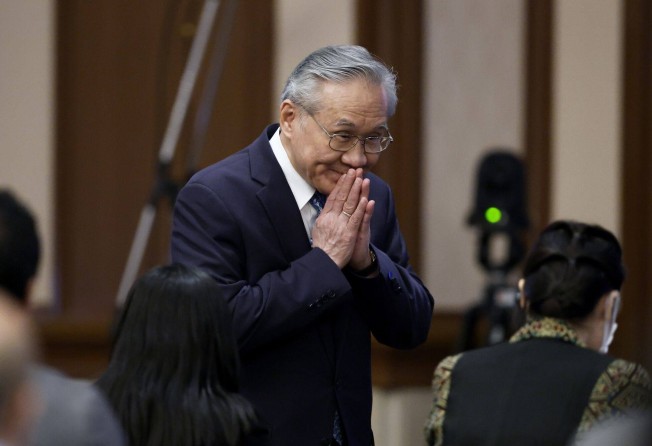
Asean centrality in spotlight as Thailand’s Myanmar talks expose divisions in regional bloc
- Key Asean members stay away even as Thailand’s outgoing government justifies the Myanmar talks as pressing given the influx of refugees into Thailand
- The informal talks have threatened to dismantle any progress Asean has made on the issue so far, critics say

Thailand’s caretaker government triggered quite the controversy earlier this week, when it hosted an informal dialogue among Asean member states that included a senior official from Myanmar’s junta, in what has been described as a bid to find a swift solution to the country’s deadly ongoing crisis.
Monday’s meeting was highly irregular. While there is no rule in the Asean charter to prohibit a member state from organising informal dialogues, such meetings are typically called by the chair, which is rotated among members on an annual basis and currently occupied by Indonesia.
Thailand’s foreign affairs ministry said on Sunday that the informal dialogue was to complement efforts by the Association of Southeast Asian Nations (Asean) to end the violence in Myanmar and mediate a solution between the junta and its political opponents, many of whom have been jailed or detained indefinitely while awaiting trial for various offences levied against them by the military government.
Thai foreign affairs minister Don Pramudwinai said on Tuesday that the situation was so pressing, they could not wait for the country’s new government to take over before bringing the Myanmar issue to Asean’s discussion table, according to local news reports. Thailand held a general election last month.
Outgoing Prime Minister Prayuth Chan-ocha said the consequences from Myanmar’s conflict were especially dire for Thailand, which has seen thousands of refugees fleeing the violence crossing over the 3,000km land border shared by the two countries.
But some senior members of the 10-member bloc appeared unconvinced by Thailand’s outgoing administration.
Indonesia, Malaysia and Singapore – all vocal proponents of the 2021 decision to exclude senior representation from Myanmar’s junta at the Asean summit and senior ministers’ meetings – did not send any representatives to Bangkok for Monday’s dialogue.
Other member states reportedly sent junior officials to attend the informal talks. The only senior representatives were the foreign ministers of Thailand and Myanmar.

Critics have argued that the move by Thailand’s outgoing military-backed government threatened to dismantle what little progress the bloc had managed so far, especially by re-engaging Myanmar’s junta which has failed to live up to its promise to implement a peace plan brokered by Asean in the months after the 2021 coup.
Malaysia, in particular, has been very vocal in admonishing Myanmar’s military for using deadly force against civilians protesting the coup and their heavy-handed treatment of leaders from the overthrown government.
Saifuddin Abdullah, who was Malaysia’s foreign minister in 2021, had gone so far as to propose that Asean reconsider its long-held policy of non-interference in the affairs of member states, amid frustration over the Myanmar junta’s apparent disinterest in pursuing the five-point peace plan it had agreed to. The plan focuses on ending the violence and opening up channels for dialogue between all parties.
The informal dialogue with Myanmar’s junta indicates a split among Asean members on how to deal with the deadly conflict, which has killed at least 19,000 people, according to data from Acled, a US-based conflict-monitoring group.
While nothing binding would have come out of Monday’s meeting, the fact that Thailand’s caretaker government went ahead with it despite the resistance could be seen as a serious dent on the much-touted principle of Asean centrality.
This could indicate that any formal discussions on Myanmar in future may end up with no path forward, as all decisions in Asean must be made on consensus.
Even when the bloc could come to a common position, implementation is hampered by its policy of non-interference and in cases such as Myanmar’s coup, ends up being nothing more than a plan on paper.
The onus lies on Asean to decide whether it wants to remain a diplomatic club focused only on “mutual prosperity”, or start taking responsibility for its members’ conduct and act like a proper regional bloc.
You can’t have your cake and eat it too.
Joseph Sipalan is a correspondent at the Post’s Asia desk.